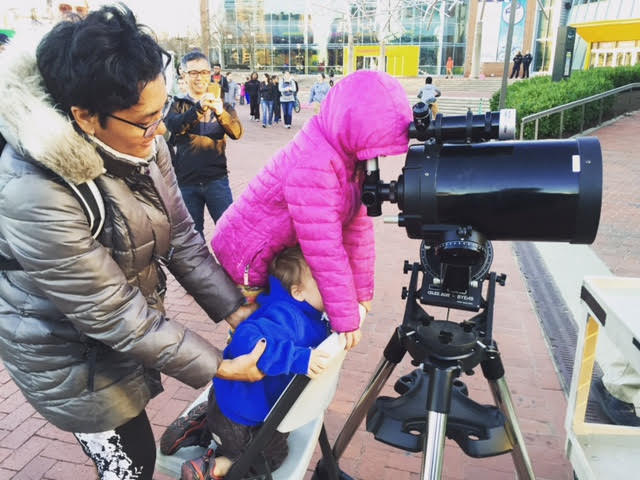Ahead of the Johns Hopkins Social Innovation Lab’s Impact and Innovation Forum tonight at 6 p.m., we’ve been profiling the entrepreneurs that are part of the current cohort. (Here’s a look at three education-focused startups and three health-focused startups.)
Here’s a look at three startups showing that science and tech can be used to engage the community:
#popscope
Stargazing is usually the stuff of solitary time in open fields away from the noise and lights, but #popscope shows that it can be a communal urban activity, too.
Viva Dadwal and Michael O’Shea began setting up telescopes in neighborhoods in Ottawa, Canada. They saw how it could transform a public space, and get people excited about science, so when they moved, they decided to spread it.
When Dadwal came to Johns Hopkins in 2014, Baltimore ended up being one of those new locations. Since then, the 90-mm refractor telescope has made appearances in Inner Harbor, Penn Station and Patterson Park, along with the sidewalks of neighborhoods like Berea. For Ariel Hicks, who is one of the lead organizers these days, an appearance in Lexington Market particularly stands out.
“I think that really hit home, when you go to places where you don’t normally see a telescope,” she said.

It’s evident that Hicks has the enthusiasm required to coax passing strangers to look through a telescope. She seemed delighted to point out that the telescope is powerful enough to see Saturn’s rings, but she’s also realistic enough to take what the light and motion of the city will give.
“As long as there’s people there, we’ll look at the moon, and the moon is good enough,” she said.
Being a part of Social Innovation Lab has helped to make new community partners, Hicks said. They recently teamed up with science-focused Barclay Elementary.
Run on all-volunteer basis, #popscope’s ultimate vision is to “empower people within their own community to take on a telescope and do it on their own,” she said.
Bright Energy Africa
Agricultural waste is often used to help fuel more growth in the fields, but it can also be used as fuel.

After spending time working with Vision 4 Youth in Tanzania, Miguel Dias learned about how groups in Africa turn waste into fuel briquettes for cooking. With an energy crisis in Tanzania, he teamed with a Vision 4 Youth CEO Violet Ayoub and a group of five others, to bring the alternative energy to the East African country. The biomass charcoal could be cheaper and longer lasting than charcoal, and reduces deforestation. At the same time, the organization is looking to primarily employ youth and women.
But the technology is necessary first. Dias spent last summer learning about biomass charcoal production, and working on how to manufacture it. During Social Innovation Lab, Dias said the team has been working on a pilot production plant. The plant is slated to be located in Arusha, Tanzania. They’re also working on a micro-franchise model that would help expand the technology to more of East Africa.
Baltimore Tax Credit Map
Ryan J. Smith’s effort to make an easier way to show homeowners what tax credits they’re eligible for started at JHU’s bi-annual HopHacks. On the other side of a stint with Hopkins’ Social Innovation Lab, the effort now has data aggregated to the neighborhood level, and Smith calculated that about $40-60 million is available if there is full adoption of the credits. It’s also connected to this video now:
https://www.youtube.com/watch?time_continue=1&v=EahRMwOIKRw
The opportunity to build partnerships was also key. Teaming with an existing campaign called Take the Credit!, which is run by the Maryland Consumer Rights Coalition and Southeast Community Development Corporation, the website became a tool to show volunteers how they could assist applicants.







